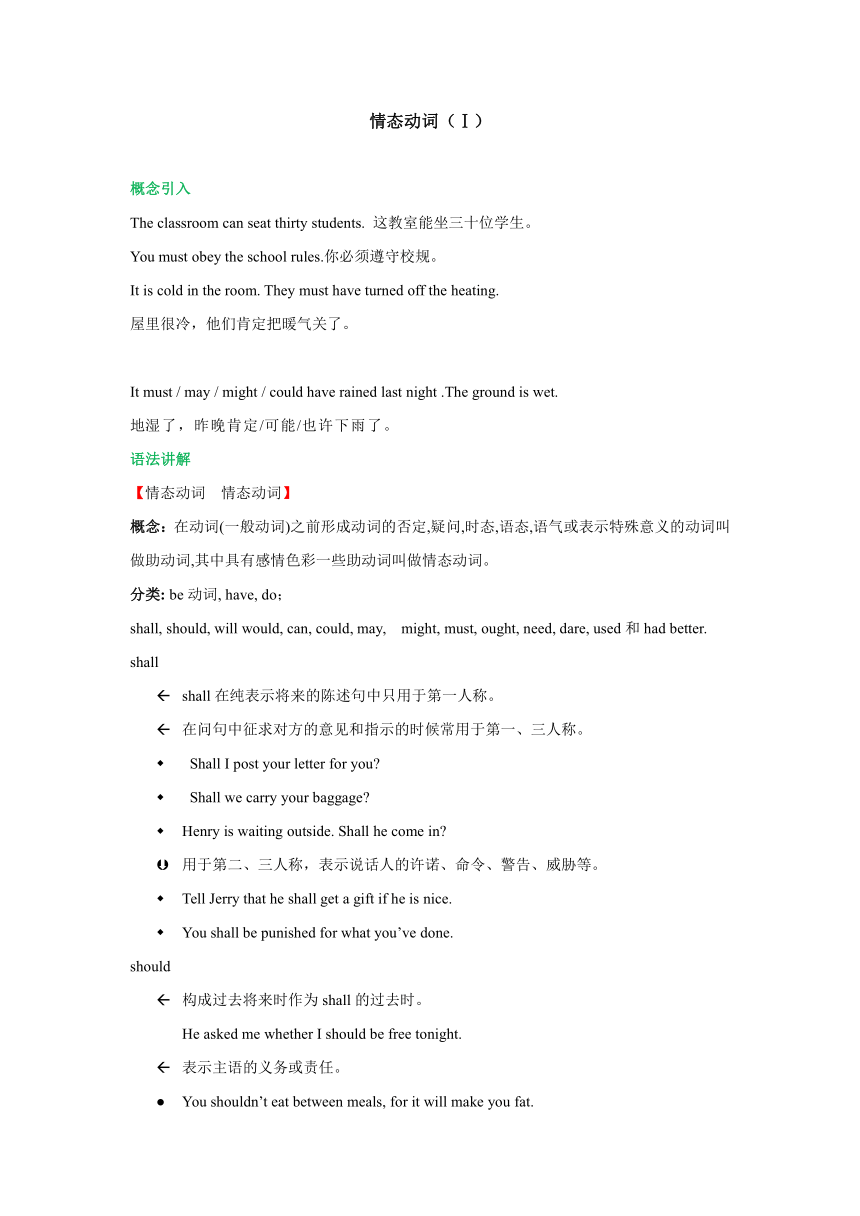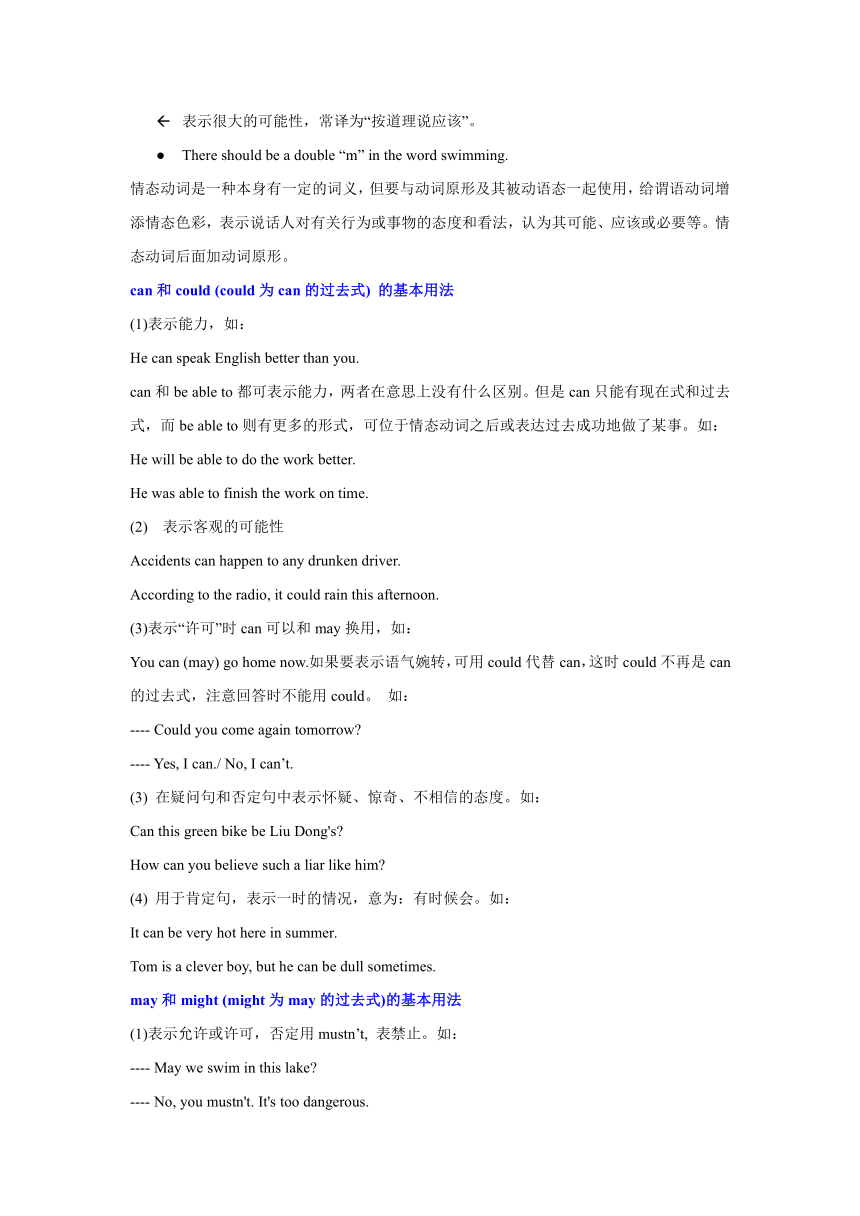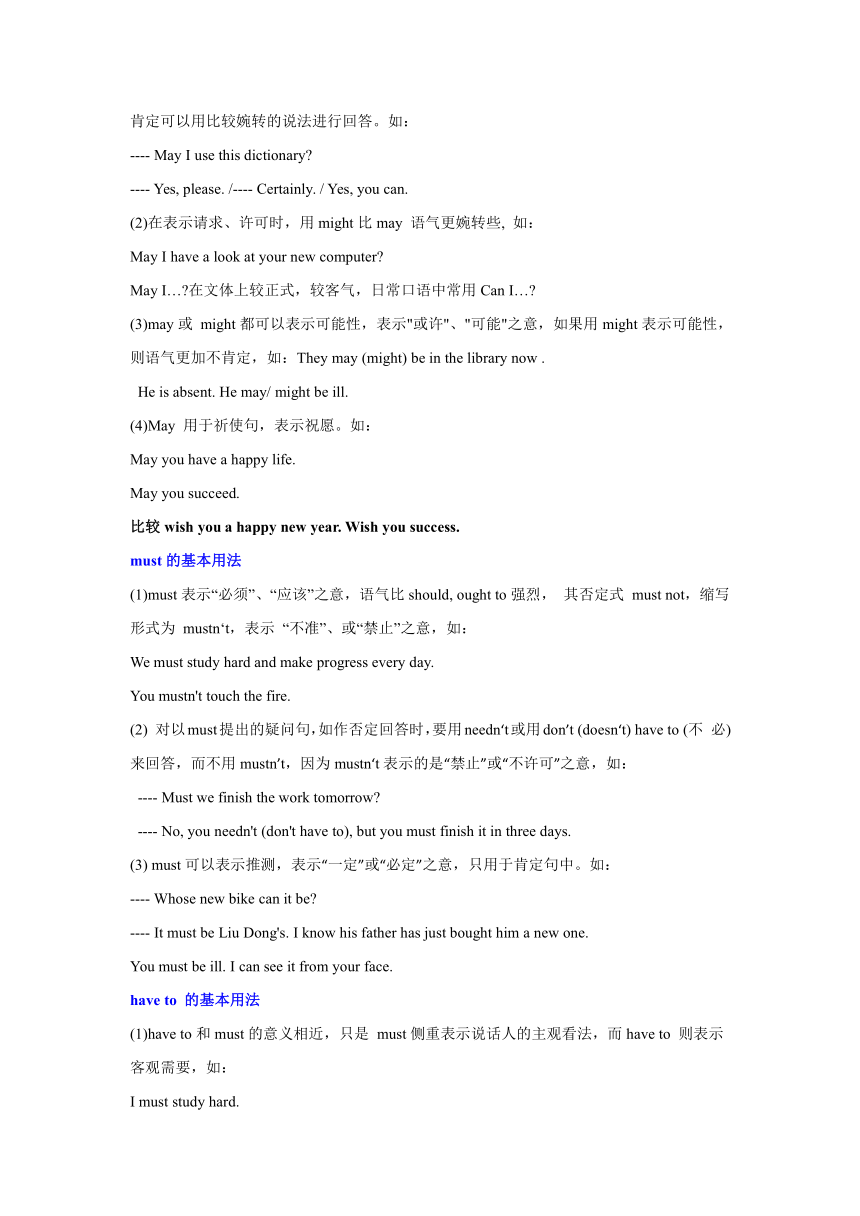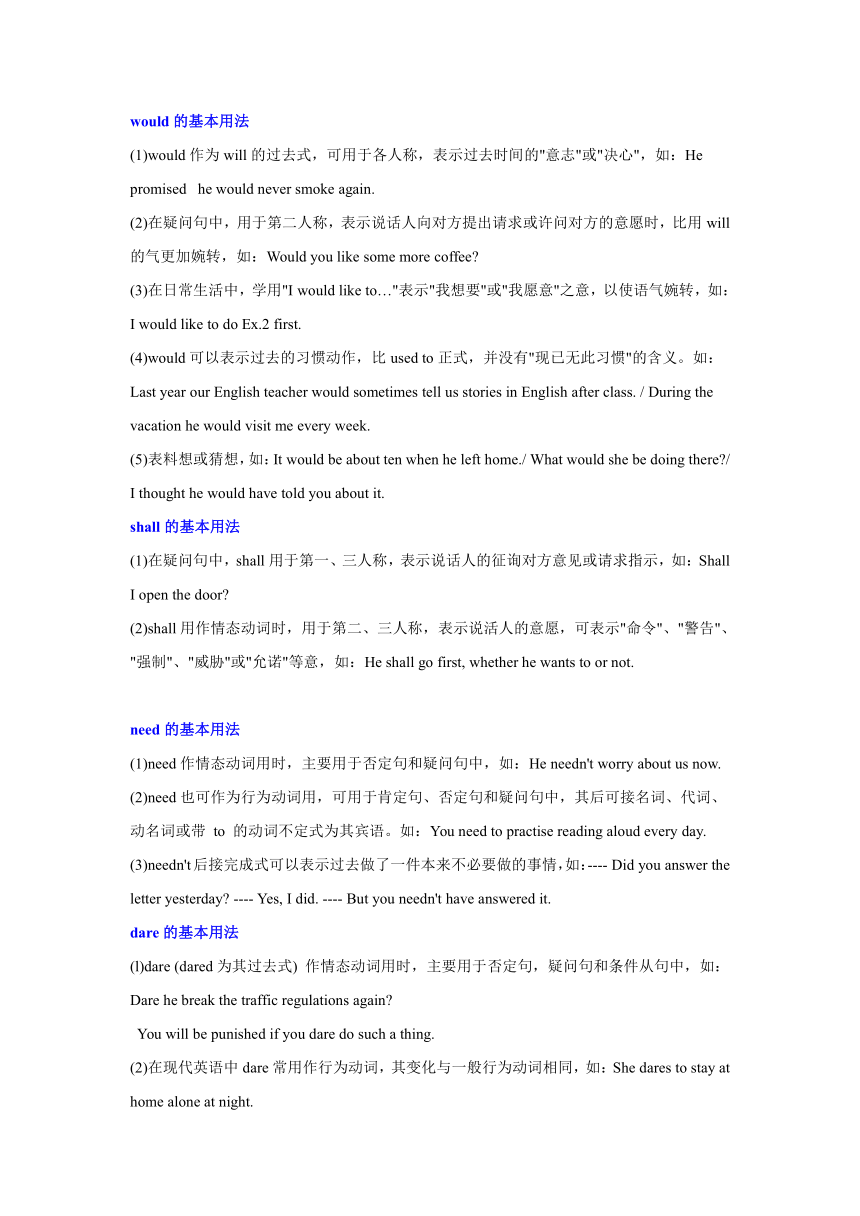北师大版高中英语模块1 Unit 3 Celebration 情态动词I
文档属性
| 名称 | 北师大版高中英语模块1 Unit 3 Celebration 情态动词I |

|
|
| 格式 | zip | ||
| 文件大小 | 29.7KB | ||
| 资源类型 | 教案 | ||
| 版本资源 | 北师大版 | ||
| 科目 | 英语 | ||
| 更新时间 | 2019-11-07 14:25:55 | ||
图片预览





文档简介
情态动词(Ⅰ)
概念引入
The classroom can seat thirty students. 这教室能坐三十位学生。 You must obey the school rules.你必须遵守校规。
It is cold in the room. They must have turned off the heating.
屋里很冷,他们肯定把暖气关了。
It must / may / might / could have rained last night .The ground is wet.
地湿了,昨晚肯定/可能/也许下雨了。
语法讲解
【情态动词 情态动词】
概念:在动词(一般动词)之前形成动词的否定,疑问,时态,语态,语气或表示特殊意义的动词叫做助动词,其中具有感彩一些助动词叫做情态动词。
分类: be动词, have, do;
shall, should, will would, can, could, may, might, must, ought, need, dare, used和had better.
shall
shall在纯表示将来的陈述句中只用于第一人称。
在问句中征求对方的意见和指示的时候常用于第一、三人称。
Shall I post your letter for you?
Shall we carry your baggage?
Henry is waiting outside. Shall he come in?
用于第二、三人称,表示说话人的许诺、命令、警告、威胁等。
Tell Jerry that he shall get a gift if he is nice.
You shall be punished for what you’ve done.
should
构成过去将来时作为shall的过去时。 He asked me whether I should be free tonight.
表示主语的义务或责任。
You shouldn’t eat between meals, for it will make you fat.
表示很大的可能性,常译为“按道理说应该”。
There should be a double “m” in the word swimming.
情态动词是一种本身有一定的词义,但要与动词原形及其被动语态一起使用,给谓语动词增添情态色彩,表示说话人对有关行为或事物的态度和看法,认为其可能、应该或必要等。情态动词后面加动词原形。
can和could (could为can的过去式) 的基本用法
(1)表示能力,如:
He can speak English better than you.
can和be able to都可表示能力,两者在意思上没有什么区别。但是can只能有现在式和过去式,而be able to则有更多的形式,可位于情态动词之后或表达过去成功地做了某事。如:
He will be able to do the work better.
He was able to finish the work on time.
(2) 表示客观的可能性
Accidents can happen to any drunken driver.
According to the radio, it could rain this afternoon.
(3)表示“许可”时can可以和may换用,如:
You can (may) go home now.如果要表示语气婉转,可用could代替can,这时could不再是can的过去式,注意回答时不能用could。 如:
---- Could you come again tomorrow?
---- Yes, I can./ No, I can’t.
(3) 在疑问句和否定句中表示怀疑、惊奇、不相信的态度。如:
Can this green bike be Liu Dong's?
How can you believe such a liar like him?
(4) 用于肯定句,表示一时的情况,意为:有时候会。如:
It can be very hot here in summer.
Tom is a clever boy, but he can be dull sometimes.
may和might (might为may的过去式)的基本用法
(1)表示允许或许可,否定用mustn’t, 表禁止。如:
---- May we swim in this lake?
---- No, you mustn't. It's too dangerous.
肯定可以用比较婉转的说法进行回答。如:
---- May I use this dictionary?
---- Yes, please. /---- Certainly. / Yes, you can.
(2)在表示请求、许可时,用might比may 语气更婉转些, 如:
May I have a look at your new computer?
May I…?在文体上较正式,较客气,日常口语中常用Can I…?
(3)may或 might都可以表示可能性,表示"或许"、"可能"之意,如果用might表示可能性,则语气更加不肯定,如:They may (might) be in the library now .
He is absent. He may/ might be ill.
(4)May 用于祈使句,表示祝愿。如:
May you have a happy life.
May you succeed.
比较wish you a happy new year. Wish you success.
must的基本用法
(1)must表示“必须”、“应该”之意,语气比should, ought to强烈, 其否定式 must not,缩写形式为 mustn‘t,表示 “不准”、或“禁止”之意,如:
We must study hard and make progress every day.
You mustn't touch the fire.
(2) 对以must提出的疑问句,如作否定回答时,要用needn‘t或用don’t (doesn‘t) have to (不 必)来回答,而不用mustn’t,因为mustn‘t表示的是“禁止”或“不许可”之意,如:
---- Must we finish the work tomorrow?
---- No, you needn't (don't have to), but you must finish it in three days.
(3) must可以表示推测,表示“一定”或“必定”之意,只用于肯定句中。如:
---- Whose new bike can it be?
---- It must be Liu Dong's. I know his father has just bought him a new one.
You must be ill. I can see it from your face.
have to 的基本用法
(1)have to和must的意义相近,只是 must侧重表示说话人的主观看法,而have to 则表示客观需要,如:
I must study hard.
You have to hand in your compositions before next Monday.
(2)have to 有人称、数和时态的变化,否定式要用助动词,don’t have to如:
They had to speed up, for the weather turned terrible.
He has to stay at home because of illness
????????????????????????????????????????
should的基本用法
(1)should表示“建议”或“劝告”,有“应该”之意,可与ought to 互换。如:
You should learn from each other.
You should/ ought to go and see Mary some time.
(2)表示推测,译作:很可能,该,是说话人对客观事物的真实性做出较大可能性的判断。如:
It’s already 10. She promised to come by 10. She should be here at any moment.
(3) why/how + should 表示“竟然”,含意外、惊异等语气。
Why should you be so late today?
I don’t understand why you should think that I did it.
(4)should后接完成式表示过去没有做到本来应该做的事情,或是做了本来不应该做的事情。如:
You should have given him more help.
You shouldn’t have left home without saying a word.
(5) 表示万一,用于if 从句
Ask Tom to ring me up if you should see him.
will的基本用法
(1) 可以表示“意志”或“决心”,如:
I have told him again and again to stop smoking, but he will not listen.
——Can someone help me? ——I will.
(2) 请求或询问对方的意愿,如:
Will you please tell me how to get to the Capital Gymnasium?
Will you open the window?
(3)表示一种习惯性的动作,有“总是”或“惯于”之意,will 指现在,would 指过去。如:Every morning he will have a walk along this river.
would的基本用法
(1)would作为will的过去式,可用于各人称,表示过去时间的"意志"或"决心",如:He promised? he would never smoke again.
(2)在疑问句中,用于第二人称,表示说话人向对方提出请求或许问对方的意愿时,比用will的气更加婉转,如:Would you like some more coffee?
(3)在日常生活中,学用"I would like to…"表示"我想要"或"我愿意"之意,以使语气婉转,如:I would like to do Ex.2 first.
(4)would可以表示过去的习惯动作,比used to正式,并没有"现已无此习惯"的含义。如:Last year our English teacher would sometimes tell us stories in English after class. / During the vacation he would visit me every week.
(5)表料想或猜想,如:It would be about ten when he left home./ What would she be doing there?/ I thought he would have told you about it.
shall的基本用法
(1)在疑问句中,shall用于第一、三人称,表示说话人的征询对方意见或请求指示,如:Shall I open the door?
(2)shall用作情态动词时,用于第二、三人称,表示说活人的意愿,可表示"命令"、"警告"、"强制"、"威胁"或"允诺"等意,如:He shall go first, whether he wants to or not.
need的基本用法
(1)need作情态动词用时,主要用于否定句和疑问句中,如:He needn't worry about us now.?
(2)need也可作为行为动词用,可用于肯定句、否定句和疑问句中,其后可接名词、代词、动名词或带 to 的动词不定式为其宾语。如:You need to practise reading aloud every day.
(3)needn't后接完成式可以表示过去做了一件本来不必要做的事情,如:---- Did you answer the letter yesterday? ---- Yes, I did. ---- But you needn't have answered it.
dare的基本用法
(l)dare (dared为其过去式) 作情态动词用时,主要用于否定句,疑问句和条件从句中,如:Dare he break the traffic regulations again?
You will be punished if you dare do such a thing.
(2)在现代英语中dare常用作行为动词,其变化与一般行为动词相同,如:She dares to stay at home alone at night.
巩固练习-情态动词
巩固练习
根据汉语提示及所给单词完成句子
1.You _______(没有必要告诉他),for I had told him about it earlier.(need)
2.We ________(本该买) a new lock for the front door.(should)
3.I’m not sure that I’m going to the lecture tomorrow afternoon.I________(可能去) Prof.Black’s class instead.(go)
4.I didn’t hear the bell ring.I ________(肯定睡着了).(asleep)
5.A dog ran in front of my mother’s car and she _______(不得不停止) very quickly.(have)
6. You ________(本应到达)earlier.(arrive)
7. She ________(一定擦了)the table, for the table is very clean.(clean)
8. _____________(你能屏住呼吸)for 5 minutes?(breath)
9. The guide suggested that we __________ (出发)tonight.(set)
10.You )___________(应该原谅)her, for it is not her fault.(forgive)
11.We _____________(一定不要嘲笑)the old people.(laugh)
12.Oil __________(漂浮)on water.(float)
13.She ___________(不可能来了),for her boss asked her to finish a lot of work today.(turn)
14.It ______________ (可能是种习俗)。(custom)
15.She ___________(过去常常开……玩笑)others.(trick)
用适当的情态动词填空:
There is 20 minutes left. We _______ (not) have to be in such a hurry.
Where is my watch? I really can’t find it. Where _____ it be?
The doctor told the old man that he ______ avoid eating fat.
It’s too late. I think he ______ go to bed.
______ you mind my troubling you with a few questions?
He ________ flee Europe before the war broke out.
Peter _______come with us tonight, but he isn’t sure.
I didn’t hear the phone .I _______ have been asleep.
My friend John ________ smoke, but now he doesn’t.
You _______ drive carefully. The road there is too narrow.
–Shall I tell John about it?
--No, you ______ .I’ve loved told him already.
12. My mother _______ have called me this morning. But she didn’t, so I was late for school and was blamed by my teacher.
根据中文意思补全下列句子:
他们必须尽快完成这个任务
They _______ ________ ________ ________ as quickly as possible.
外国也能将它们的节目传送到中国来。
Foreign countries ________ __________ their programs to China.
相信我的话,我一定让你们平安到达利物浦。
Upon my word, I _______ ________ in Liverpool.
应当首先满足世界人口的基本需要。
The basic needs of the world’s population _______ ________ _______ first.
以前这里有个公园。
There _______ _______ _______ a park here.
已经六点了。你随时都该到这儿。
It’s six o’clock now. He _____ ______ _______ at any moment.
单项填空
从A、B、C、D四个选项中,选出能填入空白处的最佳选项。
1.We hope that as many people as possible ________ join us for the picnic tomorrow.
A.need B.must C.should D.can
2.—What’s the name?
—Kevin.________ I spell that for you?
A.Shall B.Would C.Can D.Might
3.We ________ have proved great adventurers,but we have done the greatest march ever made in the past ten years.
A.needn’t B.may not C.shouldn’t D.mustn’t
4.The weather turned out to be fine yesterday.I ________ the trouble to carry my umbrella with me.
A.should have taken B.could have taken
C.needn’t have taken D.mustn’t have taken
5.There ________ be any difficulty about passing the road test since you have practised a lot in the driving school.
A.mustn’t B.shan’t C.shouldn’t D.needn’t
6.I ________ have been more than six years old when the accident happened.
A.shouldn’t B.couldn’t C.mustn’t D.needn’t
7.You don’t have to know the name of the author to find a book.You _______ find the book by t he title.
A.must B.need C.can D.would
8.Mrs. Brown,our geography teacher,________,for her bag with maps and a globe are already on the teachers’ desk.
A.must arrive B.can have arrived C.must have arrived D.has arrived
9.All my family are looking forward to meeting you.You ________ come over and have dinner with us this weekend.
A.will B.must C.may D.shall
10.—How was the journey? Did you come back by plane or by train?
—For some reason.I came back by train.I _____ back by plane,though.
A.could have travelled B.should travel
C.might travel D.would have travelled
答案解析
完成句子
1.needn’t have told him
2.should have bought
3.may/might go to
4.must have been asleep
5.had to stop
6. should/ought to have arrived
7. must have cleaned
8. Can you hold your breath
9. should set off/out
10.should for give
11.mustn’t laugh at
12.will float 13.can’t turn up
14.may be a custom 15.used to play a trick on
用适当的情态动词填空:
1. needn’t 2. can 3. should 4. must 5. Would
6. was able to 7. may 8.must 9.used to 10.shall
11.needn’t 12.should
根据中文意思补全下列句子:
1. must finish the task 2. can send 3. will land
4. must be satisfied/met 5. used to be 6. should be here
单项填空
1.D [解析]本题考查情态动词的用法。根据句意“我们希望明天有尽可能多的人能够参加我们的野餐”。可知应选D项。
2.A [解析]考查情态动词的用法。shall用于第一、第三人称,表示征求意见。would一般用于第二人称。can表示许可,一般用于否定句和疑问句。might表示委婉语气。
3.B [解析]本题考查考生对情态动词表示推测含义的掌握和运用能力。句意为“我们也许不能成为伟大的探险者,但我们在过去的十年里完成了从未有过的最伟大的远征”。根据句意可知,这里应该填情态动词表示推测。对过去情况的推测应使用情态动词的完成式;表示不十分有把握的否定推测不能使用mustn’t.而needn’t和shouldn’t加动词的完成式一般不用于表示推测。所以B项may not“可能不”是正确答案。
4.C [解析]should have done意为“本应做某事但没做”;could have done意为“可能做了某事”;needn’t have done意为“没有必要做某事但却做了”。根据句意可知C项最佳。must表推测时不能用在否定句中。
5.C [解析]本题考查情态动词的用法。A项指“禁止”;B项有“命令,允诺”等意思;C项表示主观的不应该或按客观推测不应该;D项意为“不必”。
6.B [解析]本题考查情态动词的用法。shouldn’t have done表示“不应该做而做了”。couldn’t have done表示对过去事情的否定推测。句意为“事故发生时我不可能已经六岁多了”。
7.C [解析]考查情态动词的用法。句子的意思为“想要找一本书,你不一定要知道作者的名字,你通过书名也能找到”。由题意可知应选C项。
8.C [解析]考查情态动词的用法。由题干中的for可知,此处要用表示推断的情态动词。注意:must arrive用来对现在或将来的情况进行推断;can have arrived只用于疑问句或否定句中;must have arrived用来推断过去的情况;has arrived是一种客观陈述。
9.B [解析]考查情态动词的用法。must必须;一定。句意为“我们全家人都盼望见到你。这个周末,你一定要来和我们一起吃晚饭”。如:I must shut the door,or the rain will come in.我必须把门关上,不然雨就进来了。
10.A [解析]考查情态动词的用法。答句句意为“由于某种原因,我是坐火车回来的。尽管我本可以坐飞机回来”。这是对过去情况的叙述,所以只能在A、D两项中选。could have done表示“过去本可以做某事却没有做”;would have done表示“过去将要做某事却没有做”。结合句意可知A项正确。
概念引入
The classroom can seat thirty students. 这教室能坐三十位学生。 You must obey the school rules.你必须遵守校规。
It is cold in the room. They must have turned off the heating.
屋里很冷,他们肯定把暖气关了。
It must / may / might / could have rained last night .The ground is wet.
地湿了,昨晚肯定/可能/也许下雨了。
语法讲解
【情态动词 情态动词】
概念:在动词(一般动词)之前形成动词的否定,疑问,时态,语态,语气或表示特殊意义的动词叫做助动词,其中具有感彩一些助动词叫做情态动词。
分类: be动词, have, do;
shall, should, will would, can, could, may, might, must, ought, need, dare, used和had better.
shall
shall在纯表示将来的陈述句中只用于第一人称。
在问句中征求对方的意见和指示的时候常用于第一、三人称。
Shall I post your letter for you?
Shall we carry your baggage?
Henry is waiting outside. Shall he come in?
用于第二、三人称,表示说话人的许诺、命令、警告、威胁等。
Tell Jerry that he shall get a gift if he is nice.
You shall be punished for what you’ve done.
should
构成过去将来时作为shall的过去时。 He asked me whether I should be free tonight.
表示主语的义务或责任。
You shouldn’t eat between meals, for it will make you fat.
表示很大的可能性,常译为“按道理说应该”。
There should be a double “m” in the word swimming.
情态动词是一种本身有一定的词义,但要与动词原形及其被动语态一起使用,给谓语动词增添情态色彩,表示说话人对有关行为或事物的态度和看法,认为其可能、应该或必要等。情态动词后面加动词原形。
can和could (could为can的过去式) 的基本用法
(1)表示能力,如:
He can speak English better than you.
can和be able to都可表示能力,两者在意思上没有什么区别。但是can只能有现在式和过去式,而be able to则有更多的形式,可位于情态动词之后或表达过去成功地做了某事。如:
He will be able to do the work better.
He was able to finish the work on time.
(2) 表示客观的可能性
Accidents can happen to any drunken driver.
According to the radio, it could rain this afternoon.
(3)表示“许可”时can可以和may换用,如:
You can (may) go home now.如果要表示语气婉转,可用could代替can,这时could不再是can的过去式,注意回答时不能用could。 如:
---- Could you come again tomorrow?
---- Yes, I can./ No, I can’t.
(3) 在疑问句和否定句中表示怀疑、惊奇、不相信的态度。如:
Can this green bike be Liu Dong's?
How can you believe such a liar like him?
(4) 用于肯定句,表示一时的情况,意为:有时候会。如:
It can be very hot here in summer.
Tom is a clever boy, but he can be dull sometimes.
may和might (might为may的过去式)的基本用法
(1)表示允许或许可,否定用mustn’t, 表禁止。如:
---- May we swim in this lake?
---- No, you mustn't. It's too dangerous.
肯定可以用比较婉转的说法进行回答。如:
---- May I use this dictionary?
---- Yes, please. /---- Certainly. / Yes, you can.
(2)在表示请求、许可时,用might比may 语气更婉转些, 如:
May I have a look at your new computer?
May I…?在文体上较正式,较客气,日常口语中常用Can I…?
(3)may或 might都可以表示可能性,表示"或许"、"可能"之意,如果用might表示可能性,则语气更加不肯定,如:They may (might) be in the library now .
He is absent. He may/ might be ill.
(4)May 用于祈使句,表示祝愿。如:
May you have a happy life.
May you succeed.
比较wish you a happy new year. Wish you success.
must的基本用法
(1)must表示“必须”、“应该”之意,语气比should, ought to强烈, 其否定式 must not,缩写形式为 mustn‘t,表示 “不准”、或“禁止”之意,如:
We must study hard and make progress every day.
You mustn't touch the fire.
(2) 对以must提出的疑问句,如作否定回答时,要用needn‘t或用don’t (doesn‘t) have to (不 必)来回答,而不用mustn’t,因为mustn‘t表示的是“禁止”或“不许可”之意,如:
---- Must we finish the work tomorrow?
---- No, you needn't (don't have to), but you must finish it in three days.
(3) must可以表示推测,表示“一定”或“必定”之意,只用于肯定句中。如:
---- Whose new bike can it be?
---- It must be Liu Dong's. I know his father has just bought him a new one.
You must be ill. I can see it from your face.
have to 的基本用法
(1)have to和must的意义相近,只是 must侧重表示说话人的主观看法,而have to 则表示客观需要,如:
I must study hard.
You have to hand in your compositions before next Monday.
(2)have to 有人称、数和时态的变化,否定式要用助动词,don’t have to如:
They had to speed up, for the weather turned terrible.
He has to stay at home because of illness
????????????????????????????????????????
should的基本用法
(1)should表示“建议”或“劝告”,有“应该”之意,可与ought to 互换。如:
You should learn from each other.
You should/ ought to go and see Mary some time.
(2)表示推测,译作:很可能,该,是说话人对客观事物的真实性做出较大可能性的判断。如:
It’s already 10. She promised to come by 10. She should be here at any moment.
(3) why/how + should 表示“竟然”,含意外、惊异等语气。
Why should you be so late today?
I don’t understand why you should think that I did it.
(4)should后接完成式表示过去没有做到本来应该做的事情,或是做了本来不应该做的事情。如:
You should have given him more help.
You shouldn’t have left home without saying a word.
(5) 表示万一,用于if 从句
Ask Tom to ring me up if you should see him.
will的基本用法
(1) 可以表示“意志”或“决心”,如:
I have told him again and again to stop smoking, but he will not listen.
——Can someone help me? ——I will.
(2) 请求或询问对方的意愿,如:
Will you please tell me how to get to the Capital Gymnasium?
Will you open the window?
(3)表示一种习惯性的动作,有“总是”或“惯于”之意,will 指现在,would 指过去。如:Every morning he will have a walk along this river.
would的基本用法
(1)would作为will的过去式,可用于各人称,表示过去时间的"意志"或"决心",如:He promised? he would never smoke again.
(2)在疑问句中,用于第二人称,表示说话人向对方提出请求或许问对方的意愿时,比用will的气更加婉转,如:Would you like some more coffee?
(3)在日常生活中,学用"I would like to…"表示"我想要"或"我愿意"之意,以使语气婉转,如:I would like to do Ex.2 first.
(4)would可以表示过去的习惯动作,比used to正式,并没有"现已无此习惯"的含义。如:Last year our English teacher would sometimes tell us stories in English after class. / During the vacation he would visit me every week.
(5)表料想或猜想,如:It would be about ten when he left home./ What would she be doing there?/ I thought he would have told you about it.
shall的基本用法
(1)在疑问句中,shall用于第一、三人称,表示说话人的征询对方意见或请求指示,如:Shall I open the door?
(2)shall用作情态动词时,用于第二、三人称,表示说活人的意愿,可表示"命令"、"警告"、"强制"、"威胁"或"允诺"等意,如:He shall go first, whether he wants to or not.
need的基本用法
(1)need作情态动词用时,主要用于否定句和疑问句中,如:He needn't worry about us now.?
(2)need也可作为行为动词用,可用于肯定句、否定句和疑问句中,其后可接名词、代词、动名词或带 to 的动词不定式为其宾语。如:You need to practise reading aloud every day.
(3)needn't后接完成式可以表示过去做了一件本来不必要做的事情,如:---- Did you answer the letter yesterday? ---- Yes, I did. ---- But you needn't have answered it.
dare的基本用法
(l)dare (dared为其过去式) 作情态动词用时,主要用于否定句,疑问句和条件从句中,如:Dare he break the traffic regulations again?
You will be punished if you dare do such a thing.
(2)在现代英语中dare常用作行为动词,其变化与一般行为动词相同,如:She dares to stay at home alone at night.
巩固练习-情态动词
巩固练习
根据汉语提示及所给单词完成句子
1.You _______(没有必要告诉他),for I had told him about it earlier.(need)
2.We ________(本该买) a new lock for the front door.(should)
3.I’m not sure that I’m going to the lecture tomorrow afternoon.I________(可能去) Prof.Black’s class instead.(go)
4.I didn’t hear the bell ring.I ________(肯定睡着了).(asleep)
5.A dog ran in front of my mother’s car and she _______(不得不停止) very quickly.(have)
6. You ________(本应到达)earlier.(arrive)
7. She ________(一定擦了)the table, for the table is very clean.(clean)
8. _____________(你能屏住呼吸)for 5 minutes?(breath)
9. The guide suggested that we __________ (出发)tonight.(set)
10.You )___________(应该原谅)her, for it is not her fault.(forgive)
11.We _____________(一定不要嘲笑)the old people.(laugh)
12.Oil __________(漂浮)on water.(float)
13.She ___________(不可能来了),for her boss asked her to finish a lot of work today.(turn)
14.It ______________ (可能是种习俗)。(custom)
15.She ___________(过去常常开……玩笑)others.(trick)
用适当的情态动词填空:
There is 20 minutes left. We _______ (not) have to be in such a hurry.
Where is my watch? I really can’t find it. Where _____ it be?
The doctor told the old man that he ______ avoid eating fat.
It’s too late. I think he ______ go to bed.
______ you mind my troubling you with a few questions?
He ________ flee Europe before the war broke out.
Peter _______come with us tonight, but he isn’t sure.
I didn’t hear the phone .I _______ have been asleep.
My friend John ________ smoke, but now he doesn’t.
You _______ drive carefully. The road there is too narrow.
–Shall I tell John about it?
--No, you ______ .I’ve loved told him already.
12. My mother _______ have called me this morning. But she didn’t, so I was late for school and was blamed by my teacher.
根据中文意思补全下列句子:
他们必须尽快完成这个任务
They _______ ________ ________ ________ as quickly as possible.
外国也能将它们的节目传送到中国来。
Foreign countries ________ __________ their programs to China.
相信我的话,我一定让你们平安到达利物浦。
Upon my word, I _______ ________ in Liverpool.
应当首先满足世界人口的基本需要。
The basic needs of the world’s population _______ ________ _______ first.
以前这里有个公园。
There _______ _______ _______ a park here.
已经六点了。你随时都该到这儿。
It’s six o’clock now. He _____ ______ _______ at any moment.
单项填空
从A、B、C、D四个选项中,选出能填入空白处的最佳选项。
1.We hope that as many people as possible ________ join us for the picnic tomorrow.
A.need B.must C.should D.can
2.—What’s the name?
—Kevin.________ I spell that for you?
A.Shall B.Would C.Can D.Might
3.We ________ have proved great adventurers,but we have done the greatest march ever made in the past ten years.
A.needn’t B.may not C.shouldn’t D.mustn’t
4.The weather turned out to be fine yesterday.I ________ the trouble to carry my umbrella with me.
A.should have taken B.could have taken
C.needn’t have taken D.mustn’t have taken
5.There ________ be any difficulty about passing the road test since you have practised a lot in the driving school.
A.mustn’t B.shan’t C.shouldn’t D.needn’t
6.I ________ have been more than six years old when the accident happened.
A.shouldn’t B.couldn’t C.mustn’t D.needn’t
7.You don’t have to know the name of the author to find a book.You _______ find the book by t he title.
A.must B.need C.can D.would
8.Mrs. Brown,our geography teacher,________,for her bag with maps and a globe are already on the teachers’ desk.
A.must arrive B.can have arrived C.must have arrived D.has arrived
9.All my family are looking forward to meeting you.You ________ come over and have dinner with us this weekend.
A.will B.must C.may D.shall
10.—How was the journey? Did you come back by plane or by train?
—For some reason.I came back by train.I _____ back by plane,though.
A.could have travelled B.should travel
C.might travel D.would have travelled
答案解析
完成句子
1.needn’t have told him
2.should have bought
3.may/might go to
4.must have been asleep
5.had to stop
6. should/ought to have arrived
7. must have cleaned
8. Can you hold your breath
9. should set off/out
10.should for give
11.mustn’t laugh at
12.will float 13.can’t turn up
14.may be a custom 15.used to play a trick on
用适当的情态动词填空:
1. needn’t 2. can 3. should 4. must 5. Would
6. was able to 7. may 8.must 9.used to 10.shall
11.needn’t 12.should
根据中文意思补全下列句子:
1. must finish the task 2. can send 3. will land
4. must be satisfied/met 5. used to be 6. should be here
单项填空
1.D [解析]本题考查情态动词的用法。根据句意“我们希望明天有尽可能多的人能够参加我们的野餐”。可知应选D项。
2.A [解析]考查情态动词的用法。shall用于第一、第三人称,表示征求意见。would一般用于第二人称。can表示许可,一般用于否定句和疑问句。might表示委婉语气。
3.B [解析]本题考查考生对情态动词表示推测含义的掌握和运用能力。句意为“我们也许不能成为伟大的探险者,但我们在过去的十年里完成了从未有过的最伟大的远征”。根据句意可知,这里应该填情态动词表示推测。对过去情况的推测应使用情态动词的完成式;表示不十分有把握的否定推测不能使用mustn’t.而needn’t和shouldn’t加动词的完成式一般不用于表示推测。所以B项may not“可能不”是正确答案。
4.C [解析]should have done意为“本应做某事但没做”;could have done意为“可能做了某事”;needn’t have done意为“没有必要做某事但却做了”。根据句意可知C项最佳。must表推测时不能用在否定句中。
5.C [解析]本题考查情态动词的用法。A项指“禁止”;B项有“命令,允诺”等意思;C项表示主观的不应该或按客观推测不应该;D项意为“不必”。
6.B [解析]本题考查情态动词的用法。shouldn’t have done表示“不应该做而做了”。couldn’t have done表示对过去事情的否定推测。句意为“事故发生时我不可能已经六岁多了”。
7.C [解析]考查情态动词的用法。句子的意思为“想要找一本书,你不一定要知道作者的名字,你通过书名也能找到”。由题意可知应选C项。
8.C [解析]考查情态动词的用法。由题干中的for可知,此处要用表示推断的情态动词。注意:must arrive用来对现在或将来的情况进行推断;can have arrived只用于疑问句或否定句中;must have arrived用来推断过去的情况;has arrived是一种客观陈述。
9.B [解析]考查情态动词的用法。must必须;一定。句意为“我们全家人都盼望见到你。这个周末,你一定要来和我们一起吃晚饭”。如:I must shut the door,or the rain will come in.我必须把门关上,不然雨就进来了。
10.A [解析]考查情态动词的用法。答句句意为“由于某种原因,我是坐火车回来的。尽管我本可以坐飞机回来”。这是对过去情况的叙述,所以只能在A、D两项中选。could have done表示“过去本可以做某事却没有做”;would have done表示“过去将要做某事却没有做”。结合句意可知A项正确。
